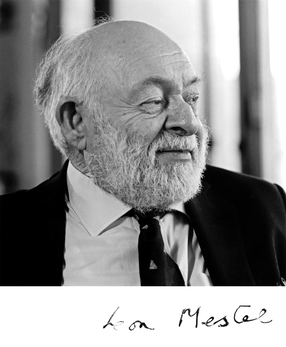Leon Mestel facts for kids
Quick facts for kids
Leon Mestel
|
|
|---|---|
 |
|
| Born | 5 August 1927 Melbourne, Australia
|
| Died | 15 September 2017 (aged 90) |
| Alma mater | Trinity College, Cambridge (B.A. 1948, PhD 1952) |
| Awards | Eddington Medal (1993) |
| Scientific career | |
| Thesis | Some problems of stellar structure (1952) |
| Doctoral advisor | Fred Hoyle |
| Doctoral students | Donald Lynden-Bell, Richard Bruce Paris |
Leon Mestel (born August 5, 1927 – died September 15, 2017) was an Australian astronomer and astrophysicist. He was a very respected professor at the University of Sussex. He loved studying how stars are born and how they work. He was especially interested in how stars have their own magnetic fields and how these fields move through space. He won important awards like the Eddington Medal in 1993 and the Gold Medal of the Royal Astronomical Society in 2002 for his amazing work in astronomy. After he retired, he wrote articles about other famous scientists.
Early Life and Family
Leon Mestel was born in Melbourne, Australia, on August 5, 1927. His father, Solomon Mestel, was a rabbi, and his mother, Rachel, was a schoolteacher. When he was three years old, his family moved to England. They lived in Forest Gate, a part of east London.
He went to West Ham Secondary School in London. Later, he studied at Trinity College, Cambridge. He earned his first degree there in 1948 and his PhD in 1952.
In 1951, Leon Mestel married Sylvia Louise Cole, who passed away in 2014. They had four children: two sons named Ben and Jonathan, and two daughters named Rosie and Leo. One of his sons, Jonathan Mestel, born in 1957, is a mathematics professor. He is also a famous chess grandmaster.
Studying the Stars
Mestel's main work was in astrophysics. This is the study of how the universe works. He was very interested in how stars are made and how they change over time. He also studied cosmic magnetism, which is about magnetic fields in space. He looked at how these fields affect things like pulsars, which are spinning stars.
After getting his PhD, Mestel worked as a research fellow at the University of Leeds from 1951 to 1954. During this time, in 1952, he became a Fellow of the Royal Astronomical Society. This is a special group for astronomers. Then, he spent a year, from 1954 to 1955, at Princeton University in the United States.
When he came back to England, he taught mathematics at the University of Cambridge. He was there for eleven years, from 1955 to 1966. He was also a Fellow at St John's College during this time. In 1961 and 1962, he visited the Institute for Advanced Study in Princeton, New Jersey, for more research.
In 1963, he wrote an important paper. It described something that happens when galaxies and stars form. This idea became known as a 'Mestel disk'.
In 1966, Mestel became a professor at the University of Manchester. Before starting there, he spent a year in Israel at the Weizmann Institute. He taught applied mathematics in Manchester for six years, from 1967 to 1973. His last job was as a professor of astronomy at the University of Sussex. He started there in 1973 and worked for nineteen years.
In 1977, Leon Mestel was chosen as a Fellow of the Royal Society. This is a very high honor for scientists. He retired in 1992 and became an Emeritus Professor at Sussex. This means he kept his title even after retiring.
Awards and Honors
Leon Mestel received several important awards for his contributions to astronomy:
- 1993 – He was given the Eddington Medal. This award recognized his important work on cosmic magnetism.
- 2002 – He received the Gold Medal of the Royal Astronomical Society. This is one of the highest awards in astronomy.
Later Years and Legacy
After he retired, Leon Mestel continued to write. He wrote many articles about other famous physicists and astrophysicists. These articles appeared in publications like The Independent newspaper and the Oxford Dictionary of National Biography. He wrote about scientists such as Martin Schwarzschild and Subrahmanyan Chandrasekhar.
In 2002, Mestel was invited to speak at a conference in Wales. This event was held to remember Fred Hoyle, another famous astronomer. In 2004, he helped organize a meeting at the Royal Astronomical Society. It marked 60 years since the death of Arthur Eddington, a very important scientist.
In 2009, Mestel was featured in a book called Portraits of Astronomers. This book included pictures and stories of many leading astronomers from the UK. In 2008, he moved back to Cambridge to be with his family. He passed away there in September 2017.
 | Georgia Louise Harris Brown |
 | Julian Abele |
 | Norma Merrick Sklarek |
 | William Sidney Pittman |

